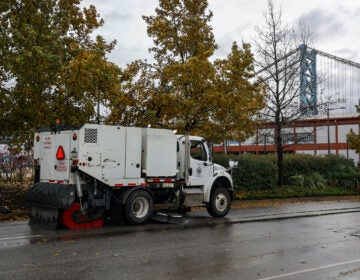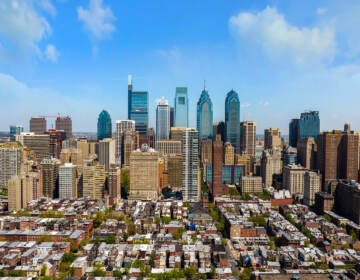City Council cheat sheet: What Philly’s legislators wanted to do and how it actually worked out
Bay windows, curb cuts, community benefits, zoning, L&I inspectors. Lots of issues were tossed around. The session wasn’t soda-tax dramatic, but still…
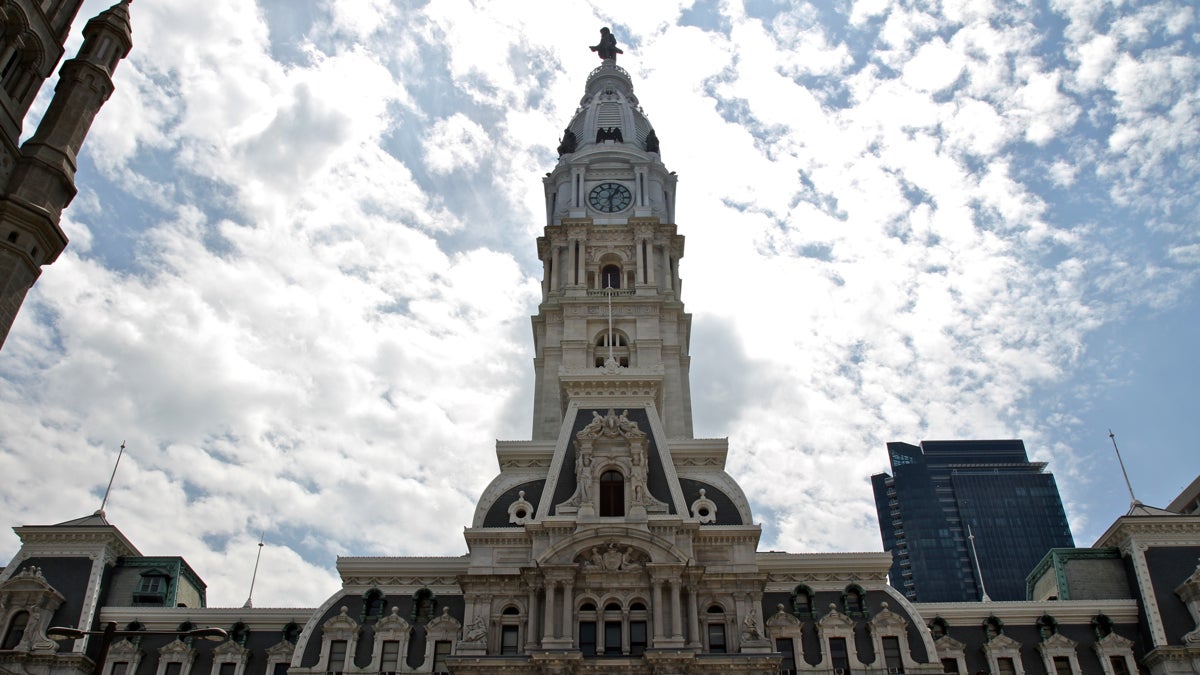
Philadelphia's City Hall Tower (Emma Lee/WHYY)
The spring 2019 session of City Council ended quietly a couple weeks ago. The all-important primary elections sucked up a lot of oxygen, with little of the machinations and political wheedling that characterized debates over the soda tax, the fair work week, or affordable housing policy.
But that’s not to say there wasn’t drama. Here’s PlanPhilly’s semi-annual roundup of all the bills we covered this session — and what became of them.
Zoning and land use
More roads coming for waterfront development
Six years ago, City Council created the Central Delaware River zoning overlay to encourage development along the oft-neglected waterfront.
This session Councilman Mark Squilla proposed adding more “River Access Roads” to the overlay, a designation that keeps projects from cutting the public off from the water with private development.
Status: Signed into law.
Land bank fix gets held up, again
Councilmember Maria Quiñones-Sánchez introduced this bill — which sought to reform the city’s deeply troubled land sale process without dampening City Council’s unusually strong oversight.
The bill never received a hearing, but much of its intent was included in legislation introduced by City Council President Darrell Clarke at the end of the spring session.
Status: Effectively Dead
Wheeling and dealing lets 4601 Market sale move forward
After the city pumped $50 million into the rehabilitation of the historic building at 4601 Market St. for use as the new police headquarters, PPD said it wasn’t interested.
Everyone involved wanted to get the white elephant off of Philadelphia’s books — but Councilwoman Jannie Blackwell mysteriously delayed the sale, confusing and angering everyone from Mayor Kenney to local neighborhood groups.
Blackwell eventually let it move forward, but only after receiving a letter from the mayor saying that he would work with her to solve completely unrelated issues facing a longtime Blackwell supporter and real estate developer.
Status: Signed into law
Contested Fishtown St. Laurentius project gets spot zoned
Leo Voloshin has been trying to redevelop the St. Laurentius church in Fishtown into apartments for over three years. After winning an approval from the Zoning Board of Adjustment, he got tied up in a seemingly endless court battle. This session, City Council President Clarke introduced a bill to remap the parcel to allow apartments to be built without a variance.
The mayor signed the bill in March, but it is unclear if Voloshin thinks the building is too far gone now to be salvaged. He did not respond to a request for comment.
Status: Signed into law
Potential supervised injection site is blocked
The opioid crisis has taken a devastating toll on Philadelphia, with over 1,000 deaths from overdose each of the past two years. Advocates want to open a saje injection site, which would give addicted individuals a safe place to use drugs under nurse supervision to help prevent deaths.
There are many opponents of the idea, and the effort faced another setback when Councilmember Mark Squilla introduced a bill that would change the zoning for a parcel of land where proponents hoped to place the injection site. Passed at the end of the session, it would rezone the abandoned warehouse from commercial mixed use to single family residential.
Status: On Mayor Kenney’s desk.
’Fresh food’ zoning loophole closed
To encourage the sale of fruits and vegetables, the city offered developers 15 additional feet of height on their project if they devoted half the “display area” to the sale of fresh produce.
Neighborhood groups hated the zoning bonus, which they saw as ineffective. Council passed a bill at the end of this session that would require developers to provide a much more tangible 5,000 square feet of space to a fresh food market in exchange for the additional height.
Status: On the mayor’s desk.
Italian Market bans curb cuts
A new apartment building is coming to the southern end of the Italian Market. The latest objection to the 157-unit building, which will tower above the low-slung commercial district, is that its underground garage exits onto 9th Street — increasing car traffic on the pedestrian friendly strip.
In response, Councilman Mark Squilla got a bill passed to ban curb cuts on 9th Street between Catherine and Federal. It won’t stop the new apartment building’s curb cut, but will make similar plans difficult to enact in the future
Status: On the mayor’s desk.
Medical marijuana sales restricted — in West Philadelphia and elsewhere
Councilman Curtis Jones said he doesn’t want City Line Avenue to become “the Atlantic City of recreational and medical marijuana,” so he introduced a bill last year to ban future dispensaries from eight commercial corridors in his West Philly district.
The bill, which finally passed this spring session, also requires those seeking to open one to hold a meeting with neighborhood groups before they can secure a permit.
Status: Enacted without the mayor’s signature
Community benefits quid pro quo?
Noah Ostroff’s projects at 2401 Washington Ave. was briefly hailed as an example of how neighborhood groups could secure community benefits agreements from developers.
The South of South Neighborhood Association first won a raft of commitments for the mega-project. Then Councilman Kenyatta Johnson introduced legislation to remap the land so the project could move forward without a trip to the zoning board.
However, a different community group objected — and the bill got held until fall.
Status: Held in committee
The infamous bay window ban
The same week that he beat back a challenger in the Demoratic primary, Councilman Kenyatta Johnson introduced a bill to ban bay windows and balconies from his district.
The heavy-handed bill captured the imagination of the city, spawning editorials from the Philadelphia Inquirer, indignant snorts from libertarians at Reason magazine, jabbing comedic op-eds, and a cartoon by Signe Wilkinson.
Although tools exist to regulate new construction in geographically-specific areas–like conservation or historic districts–the councilman baffled observers by seeking an outright ban instead. His commitment wasn’t ironclad: after the bill sailed through a committee hearing, Johnson withdrew it from consideration — to guffaws from his colleagues.
Status: Suspended.
Oregon Avenue shopping plazas get residential
Large crowds of protesters organized by the Concerned Citizens of Point Breeze booed and heckled Kenyatta Johnson’s proposed remapping of a shopping plaza at the edge of South Philadelphia to allow residential development.
The ShopRite and most of the other shops will be staying, and Johnson proved unsympathetic to the activists because they didn’t live next to the proposed development. The remapping easily passed City Council
Status: On the mayor’s desk.
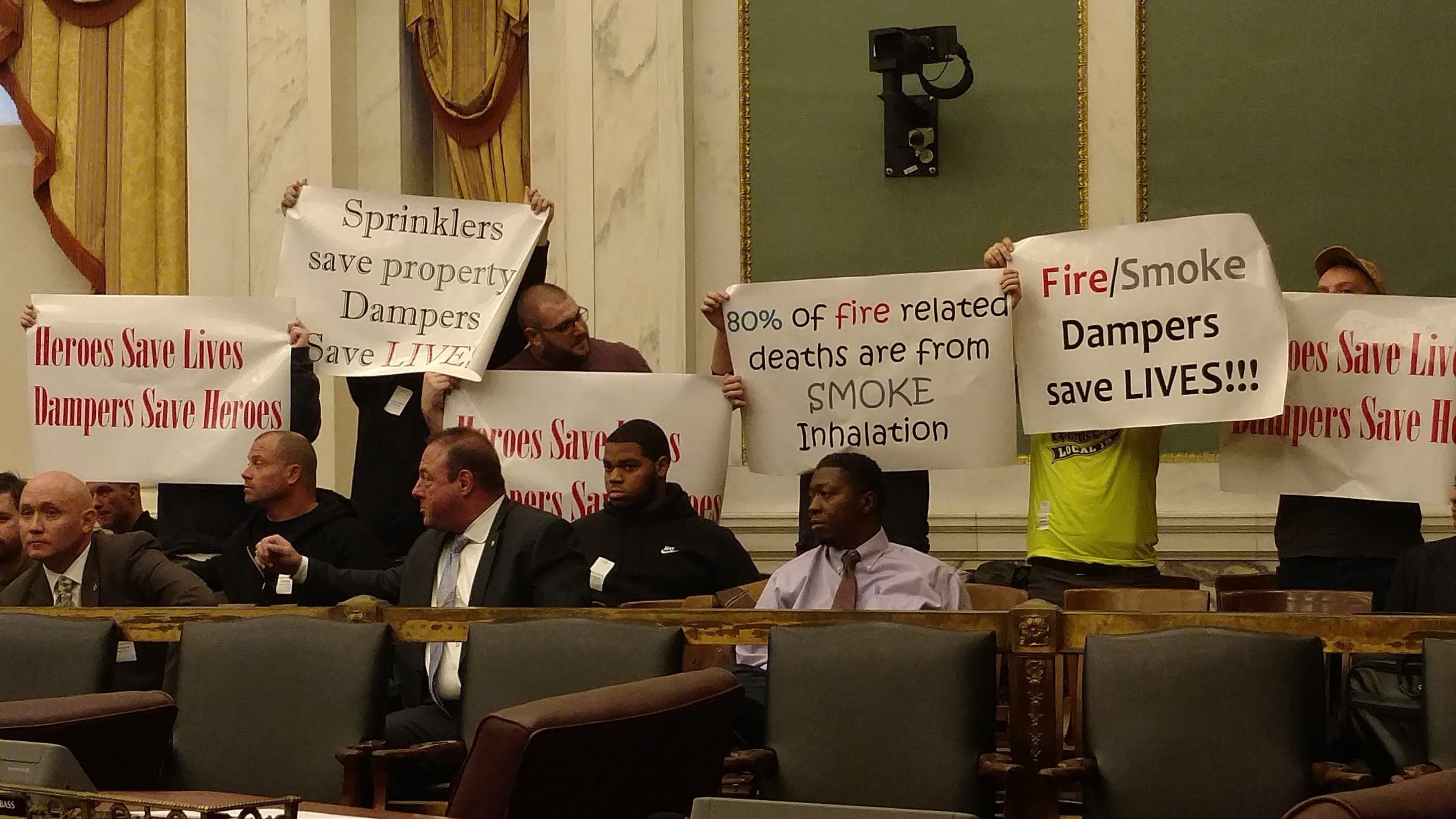
Labor unions
Parking garage workers win ‘just cause’ protections
Councilwoman Charelle Parker moved to strongly regulate labor practices in the city’s parking garages this session. She got two bills passed, one that would require the Department of Licenses and Inspections to regulate minimum staffing levels, and another that requires employers have a “just cause” for firing their workers. Similar protections generally only apply to unionized workers.
The parking garage industry fought the bills. Councilman Allan Domb, who owns several parking garages, recused himself from voting on the legislation.
Status: Signed into law.
Crackdown on non-union contractors gets bumped by bad timing
On the very week Councilman Bobby Henon was indicted on political corruption charges, he introduced a bill that would quintuple the number of Licenses and Inspections investigators and another to create a “Contractor Review Board.”
The timing was especially inauspicious because the indictment alleges, in part, that Henon tried to weaponize the L&I inspectorate to punish foes of labor leader John “Johnny Doc” Dougherty, who was also indicted.
Henon couldn’t introduce the bills because he was in court pleading not guilty, so Councilmember Bill Greenlee introduced them on his behalf. Neither received a hearing.
Status: Effectively Dead.
Pushes for more L&I inspectors
Shortly after Henon introduced his bills, Councilmember Bass introduced her own bid to requisition more funding for L&I. Usually this kind of thing is taken care of during budget negotiations. Presumably that’s what happened here, as the bill never received a hearing.
Status: Effectively Dead.
After almost a decade, Sheet Metal Workers triumph
The politically influential Sheet Metal Workers Local 19 began pushing a fire damper reform bill almost a decade ago. The union says it wants to ensure safety by mandating in-person inspections in high rise buildings. Industry groups argue that the effort is simply make-work legislation to garner more jobs.
Local 19’s efforts ramped up after they retained former Councilman Frank DiCicco as a lobbyist. Last year Councilmember Jannie Blackwell introduced the legislation anew. This session it finally went through, despite extremely heated hearings and the union’s expletive-laden confrontation with an administration official outside City Council’s chambers.
Status: Signed into law.
Plumbing Code gets updated to allow more plastic pipes
A 2018 memorandum of understanding between the Plumbers Union and the Building Industry Association finally got written into a bill and passed by the City Council. Iron piping will no longer be required as extensively in Philadelphia high rises.
Status: On the mayor’s desk.
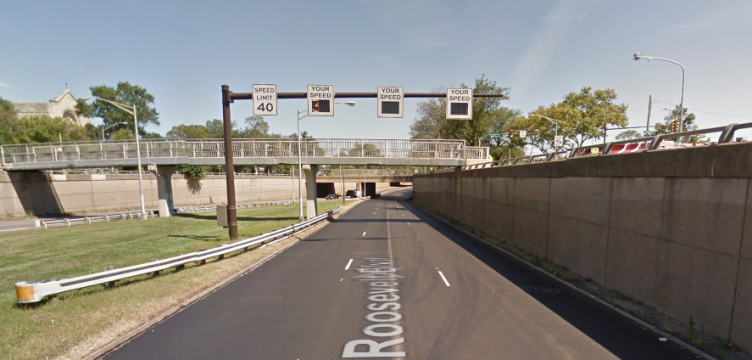
Transportation
Roosevelt Boulevard creeps closer to speed cameras
Roosevelt Boulevard is the most dangerous roadway in Philadelphia. City officials have long wanted to install speed cameras along the highway to deter dangerous driving. But Republicans in Harrisburg held up the bill until last year, when retiring Philly GOP state Rep. John Taylor pushed it through as his swansong.
City Council then put forth its own ordinance approving the move, which went forward without a hitch.
Status: Signed into law.
There’s a new rideshare player in town
A German company wants to bring a new form of car sharing to Philadelphia, which would allow customers to drop the vehicles wherever they want instead of in specially designated spots. Council passed a bill to allow the “flexible car sharing companies” to pay the parking authority per vehicle on the street in exchange for parking in public spaces.
Status: On the mayor’s desk.
State keeps stranglehold on PPA
Rogue Republcan Councilman David Oh has for years beefed with the Philadelphia Parking Authority, a Republican-controlled patronage den. It hasn’t made him popular with the party diehards — and it hasn’t done him much good legislatively either.
His bill to give locals more control over the agency got yanked, again, after Streets Committee chairman Mark Squilla got a call from the city’s lawyers saying that it would get Philadelphia sued.
Status: Effectively Dead.
Quasi-traffic cops to the rescue?
Last year, Council President Darrell Clarke introduced a resolution to create a class of unarmed public safety officers to help regulate traffic congestion and quality-of-life street violations. This session the proposal moved through City Council and was posed as a ballot question. It won the approval of 69 percent of voters.
The police should be on the streets by this time next year.
Status: Enacted.

Non-zoning housing bills
Reforming the 10 year property tax abatement
At the beginning of the session, Helen Gym introduced two bills to reform the city’s hotly contested 10 year tax abatement. Like her previous two attempts, these proposals have not yet received a hearing.
Allan Domb’s abatement reform also did not receive a hearing. There’s a pattern here.
Status: In committee.
Lead safety bill gets punted by its sponsor
Blondell Reynolds Brown, one of the Council’s longest serving members, announced she wouldn’t run for re-election. For much of her second-to-last session, she focused on advancing an ambitious lead safety bill which would require lead inspections of pre-1978 rental homes.
But at the last minute, to the shock of advocates, she said more discussion with industry stakeholders was needed and pulled her bill from the final passage calendar.
Status: Suspended.
The fruits of the Historic Preservation Task Force
Philadelphia’s historic preservation regulations have not kept pace with the city’s development boom, so Mayor Jim Kenney’s Historic Preservation Task Force proposed a raft of legislative fixes.
At the end of the session, Councilmember Squilla introduced the first package: Eliminating parking minimums for historic rehab projects, adding accessory dwelling units in historic buildings, making historic institutional conversions easier.
Status: Introduced.
Right to Counsel coming to Philadelphia?
New York City, San Francisco and Newark have all introduced legislation to provide legal assistance to low-income renters who wind up in eviction court. Councilmember Helen Gym introduced legislation to move Philadelphia in the same direction for a cost of between $4 and $5 million annually.
The bill hasn’t yet received a hearing but Gym did secure $1.5 million for eviction prevention in this year’s budget negotiations. This is the third year in a row she’s won an increase in funding.
Status: Introduction.
Making landlords pay for bed bugs
Philadelphia is one of the only cities that doesn’t outline who is responsible for taking care of bed bug outbreaks. At the beginning of the session, Mark Squilla introduced a bill to stick landlords with the bill.
Or not. The bill never even received a hearing.
Status: Effectively dead.
Soda tax, gender neutral bathrooms, and everything else
More gender neutral bathrooms
Helen Gym introduced a pair of bills to require more gender neutral bathrooms in City Hall and to bring charter schools and other educational institutions into line with the School District’s gender fluid language policies. Critics said she was just grandstanding.
But the bills, which were introduced too late to be heard in the spring session, address a real need. There’s currently only one gender neutral bathroom in City Hall and it’s on the seldom visited 7th floor.
Status: Introduced.
Phase out the soda tax?
Perennial soda tax opponent Quiñones-Sánchez put forward an alternative strategy this session, with the support of her Republican colleagues along with Democrats Allan Domb and Cindy Bass. (Blondell Reynolds Brown endorsed it at first, but quickly asked her name be taken off the legislation.)
The bill would phase out the tax through 2021, although it did not specify by how much, leaving open the possibility of a complete elimination. A resolution introduced with the bill, and with considerably more sponsors, called for a study of the tax’s effects on local businesses, while offering a tax of single use plastic bags as an alternative.
Not surprisingly, given the soda tax’s importance to Mayor Kenney’s agenda, the bills have not even received a hearing. But Quiñones-Sánchez’s diehard opposition to the tax didn’t go unappreciated by the beverage industry, which spent a staggering $631,000 to protect her seat in a closely fought primary.
Status: The bill is only introduced, the resolution was adopted.
Plastic bag ban and fee
For the fourth time in 12 years, City Council will consider restrictions on plastic bags. The legislation introduced by Mark Squilla would ban lightweight plastic bags and non recyclable paper bags, while placing a 15 cent fee on more robust plastic bags and recyclable paper bags.
It will be considered in the fall.
Status: Introduced.
Liquid Natural Gas plant incoming
One of the most contentious votes this session came at the second to last meeting, where a new $60 million liquified natural gas plant won approval in a 13-to-4 vote.
Environmentalists argued that the city shouldn’t be encouraging any kind of carbon-based energy production in the city. The plant will be constructed in South Philadelphia, which is about to lose its gasoline refinery.
Status: Signed into law.
Brian O’Neill’s food truck ban
Republican Councilman Brian O’Neill moved to ban food carts from his Far Northeast district. He argues that they unfairly compete with brick-and-mortar restaurants, which should be privileged because they pay property taxes.
The bill passed with only Coumcilmember Helen Gym voted against it, a rare instance of a legislator bucking the tradition of Councilmanic prerogative, where district members’ colleagues vote in lockstep with them on any bills affecting their own territories.
O’Neill is the second Council district to ban food cars, which were outlawed in the lower Northeast in the late 1990s.
Status: Enacted without the mayor’s signature.
Making city contracts easier to obtain for minority owned businesses
Councilman Derek Green got a bill passed to raise the threshold for triggering a Request for Proposals on city contracts. He reasoned that small, and often minority owned businesses struggle to complete the RfP process and raising the limit to $100,000 would mean more small businesses could easily win small contracts.
Green’s bill requires a charter change, so voters will get to decide if he’s right at the next election.
Status: On the ballot in November.
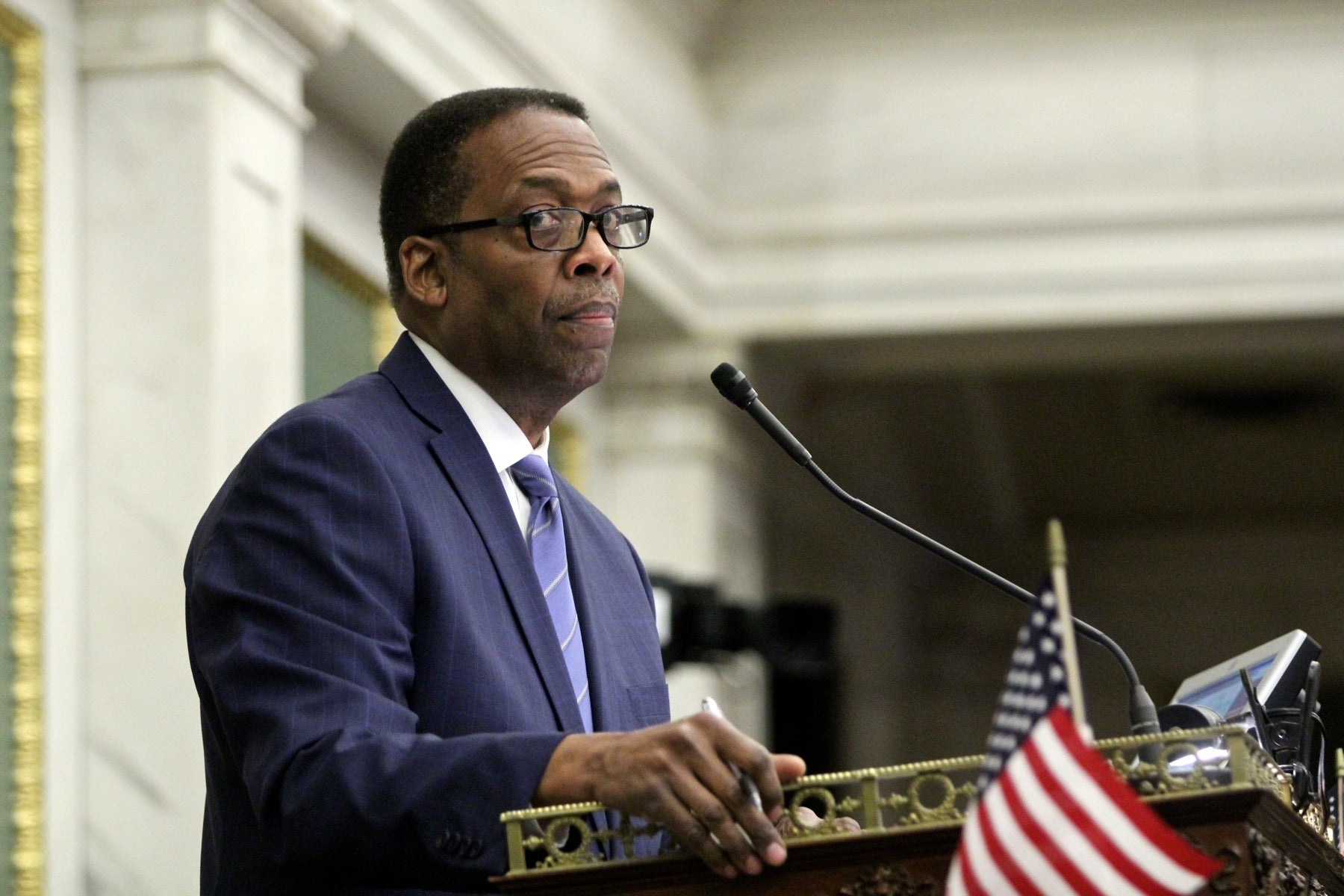
Darrell Clarke’s Agenda
Clarke’s duplex ban in part of North Philadelphia and his attempt to ban multi-family variances
Over the course of the spring session, City Council President Clarke’s annoyance with multi-family development became ever more pronounced.
First, he introduced a bill to ban duplexes from an area around Temple University that is already zoned for single family housing. The largely symbolic bill passed Council.
Status: On the Mayor’s Desk
Second, he introduced a bill that would ban the Zoning Board of Adjustment from granting multi-family variances in parts of his district that are zoned multi-family. Most legal experts PlanPhilly spoke with believed that bill wouldn’t pass muster in court, and Clarke ended up not bringing it to committee.
Status: In committee
Third, he announced a bid to reshape the whole zoning code…
Clarke and O’Neill spearhead zoning reform to limit density
Ever since City Council passed the new zoning code in 2012, City Council President Clarke has tried to undermine the updated parking and density regulations. He says Philadelphia is growing too fast and that not enough parking is being provided for all the new residents, while new development is too often out of proportion with its surroundings.
Now Clarke’s frustrations have reached a breaking point, and he introduced a resolution to create a Zoning Code Review Commission to address these concerns. It isn’t yet clear who will sit on it, but developers and affordable housing advocates will be watching this process with bated breath.
Status: Passed
Requiring community benefits agreements?
Zoning reform isn’t the only major initiative Clarke got started last session that will be continued in the fall. He also introduced a bill that would require major developers to institute community benefits agreements with surrounding neighborhoods.
Critics say the bill is ill-defined–who constitutes the community, exactly?–and would exacerbate the city’s contentious development process. But Clarke and supporters of the idea say they just want to make sure existing neighbors get something when a major new building goes up in their midst.
Status: Introduced
Bye, bye Vacant Property Review Committee?
Clarke’s final major initiative, which will also be pursued in the fall, is a bid to reform the city’s land sale process. After months of controversies and scandals involving City Councilmembers and other officials—including Clarke–getting too involved in individual land sales, the Council President unveiled a plan to change the controversial process.
The biggest takeaway is that the opaque Vacant Property Review Committee–one of Council’s means of influencing individual land sales–would be eliminated. The bill includes other measures, such as metrics to incentive land sales to minority owned and and smaller developers.
Status: Introduced
WHYY is your source for fact-based, in-depth journalism and information. As a nonprofit organization, we rely on financial support from readers like you. Please give today.




